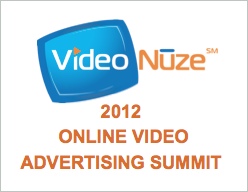-
Innovid Enhances iRoll With VAST/VPAID Tag Creation
Innovid, which enables online video advertisers and publishers to add interactive elements such as Facebook, YouTube, Twitter and sharing to their campaigns, is announcing that VAST and VPAID ad tags will now be auto-created within its iRoll Studio.
The enhancement eliminates the work flow process step of advertisers and publishers needing to submit their ads back to Innovid for tags to be created before campaigns can be trafficked out. This in turn reduces cost and resources to turn typical pre-roll ads into an iRoll ad.Categories: Advertising, Technology
Topics: Innovid
-
Comcast Authenticates HBO GO on Xbox As Online Delivery Shifts Industry Leverage
Comcast announced on its blog on Friday that it will indeed authenticate HBO GO for use by subscribers with both Xbox and the Xbox Live service. When Xbox initially announced two weeks ago that it was enabling Comcast's Xfinity TV, MLB.TV and HBO GO apps, Comcast (along with Time Warner Cable and Bright House) subscribers were unable to access HBO GO, because the cable operators weren't authenticating it. For Comcast subscribers, that meant the only HBO programs they could view on their Xbox was via the Xfinity app, which offers far less content. The move set off a vocal protest by Comcast/HBO/Xbox subscribers, including a much-noticed Facebook post by Netflix CEO Reed Hastings.
Categories: Cable Networks, Cable TV Operators, Devices
-
VideoNuze Report Podcast #128 - Comcast to Authenticate HBO GO on Xbox? MMOD Traffic Down
I'm pleased to be joined once again by Colin Dixon, senior partner at The Diffusion Group, for the 128th edition of the VideoNuze Report podcast, for April 6, 2012. First up this week we discuss another angle of last week's Xbox video launch - whether Comcast will reverse itself and authenticate HBO GO for its subscribers (as Netflix CEO Reed Hastings wrote openly on Facebook asking Comcast to do). Then we discuss the downturn in March Madness online traffic and the effect of Turner's new paywall.
Last week when Xbox launched a number of new video apps including Comcast's Xfinity, HBO GO and MLB.tv, Comcast made a decision not to authenticate HBO GO for its own subscribers with Xboxes, thereby forcing them to settle for HBO content that's available within its own Xfinity app. As Colin points out, that was a continuation of Comcast's (and other pay-TV operators') policy of not authenticating the HBO GO app for its subscribers using Roku.
A vocal group of Comcast/HBO subscribers with Xbox complained, with Hastings's post getting the most attention. This week, the NY Times reported that Comcast might reverse itself and authenticate HBO GO after all. It's confusing stuff, and Colin and I do our best to explain what might be going on behind the scenes with the balance of power between cable operators and cable networks.
We then discuss news that daily March Madness traffic was down 10% year-over-year, likely attributable to Turner introducing a $3.99 app to view the games for which it had broadcast rights (CBS games were still available online for free). There was a paywall up until a few years ago, when the full tournament went free online, causing an explosion of traffic and ad revenue. Colin and I interpret the new data and its broader implications for TV Everywhere.
(For everyone celebrating holidays, enjoy your weekend!)
Listen in to learn more!
Click here to listen to the podcast (18 minutes, 48 seconds)
Click here for previous podcasts
The VideoNuze Report is available in iTunes...subscribe today!Categories: Cable Networks, Cable TV Operators, Devices, Podcasts, Sports
Topics: Comcast, HBO GO, MMOD, Turner Sports, Xbox
-
Can YouTube Succeed With Online Movie Rentals?
Yesterday YouTube got a lot of coverage of its new licensing deal for hundreds of movies from Paramount
 because separately, the studio's parent company, Viacom, has been involved in a bitter copyright litigation with YouTube for years. While it's noteworthy that the parties are able to do business despite suing each other, the bigger questions here are whether YouTube's initiative to rent Hollywood movies makes sense and can succeed?
because separately, the studio's parent company, Viacom, has been involved in a bitter copyright litigation with YouTube for years. While it's noteworthy that the parties are able to do business despite suing each other, the bigger questions here are whether YouTube's initiative to rent Hollywood movies makes sense and can succeed?Categories: Aggregators, FIlms, Studios
-
Eight Media Partners On Board for June 19th Video Ad Summit
The VideoNuze 2012 Online Video Advertising Summit on June 19th is continuing to gain momentum, with eight
 leading industry organizations on board as media partners: CTAM, NATPE, OPA, REELSEO, Beet.TV, The Diffusion Group, The Ad Club of New York and Jack Myers Media Business Report.
leading industry organizations on board as media partners: CTAM, NATPE, OPA, REELSEO, Beet.TV, The Diffusion Group, The Ad Club of New York and Jack Myers Media Business Report.
All the media partners are offering special discounted early bird registration to the Video Ad Summit which they will promote through their various communications channels. I'm delighted to have these partners working with VideoNuze, helping ensure the Video Ad Summit's success (note this event takes the place of last year's ELEVATE conference which drew 400+ attendees).
In addition, MWW Group, one of the ten largest independent global agencies, will be the public relations partner for the Video Ad Summit. MWW and The Fortex Group, which it acquired last year, have been long-time partners with VideoNuze for its events.
The Video Ad Summit has an amazing group of industry executives speaking, and I'll be adding them to the web site shortly - so keep an eye out!
The Video Ad Summit is generously supported by sponsors Auditude (Adobe), YuMe, Adap.tv, Collective, Conviva, Mixpo, TubeMogul and Videology.Categories: Advertising, Events
Topics: VideoNuze 2012 Online Video Advertising Summit
-
Building the Next Remote Control: Kinect is Just the First Step
Today, I'm pleased to share a guest post from Alan Wolk, Global Lead Analyst at KIT Digital. As Alan points out, the Xbox Kinect technology has helped open up a new world of possibilities for navigating video content on TVs (I was recently in KIT's offices and played with their Kinect Sky TV app, which I thought was amazing). Beyond Kinect however, further technology improvements are coming, all of which means the remote control is poised to move far beyond its humble roots. Read on to learn more.
Building the Next Remote Control: Kinect is Just the First Step
by Alan Wolk
In the pre-cable TV world, the remote control was a truly amazing device. It allowed viewers to raise and lower the volume without getting out of their chair, while jumping seamlessly between the handful of channels that were available.
The advent of cable TV made the remote a little more complicated: with 20 or 30 channels in the line-up, the remote now needed a keypad to enter the actual channel number. The more channels cable systems added, the more critical the remote became. But around the time we moved from dozens of channels to hundreds of them, it become evident that a better system was needed: scrolling through so many channels ten at a time was not particularly time efficient, especially since viewers knew the names of channels they wanted to watch, not their constantly shifting numbers.Categories: Devices, Technology
Topics: Kinect, KIT Digital, Xbox
-
FreeWheel Powering NBCU's Digital/Mobile Video Ads
Video ad technology provider FreeWheel added another big content provider to its customer roster yesterday,
 announcing that it will be powering video ads for a group of NBCU's broadcast and cable networks' properties.
announcing that it will be powering video ads for a group of NBCU's broadcast and cable networks' properties.
In particular, the deal also covers NBCOlympics.com, the network's destination for the London games this summer. FreeWheel noted that as a result advertisers will be able to make specific digital ad buys and combined broadcast/digital packages, which NBC will be able to deliver. This opens up potential targeting at a more granular level than has been available with traditional TV.Categories: Advertising, Broadcasters, Cable Networks
-
New SkipIt Service Asks: "Would You Pay to Avoid Online Video Ads?"
The age-old question of whether viewers will pay to skip ads will be put to the test in the online video industry with "SkipIt," a clever new service SpotXchange is launching today. For participating publishers, a SkipIt "chicklet" appears when a video ad starts playing; if the viewer clicks on it, the ad closes and the content continues. Each ad skipped costs the viewer $.10, which is automatically deducted from their pre-funded account. When an ad is skipped, the advertiser receives a credit from the publisher who is paid a percentage of the viewer's fee by SkipIt. (see SkipIt's video at bottom for more)
Initial publishers testing SkipIt include CineSport, Film Annex, IDG TechNetwork, OneScreen, Tech Media Network and Tetris Online. Combined, SkipIt estimates this will represent 20 million video ads presented each day to over 100 million viewers.
Michael Shehan, SpotXchange's CEO, explained a couple of weeks ago when he previewed SkipIt for me that the service is intended to empower viewers with more choice about which ads they watch, reduce wasteful spending by advertisers and deliver a more satisfying experience by the content publisher.Categories: Advertising
Topics: SkipIt, SpotXchange


